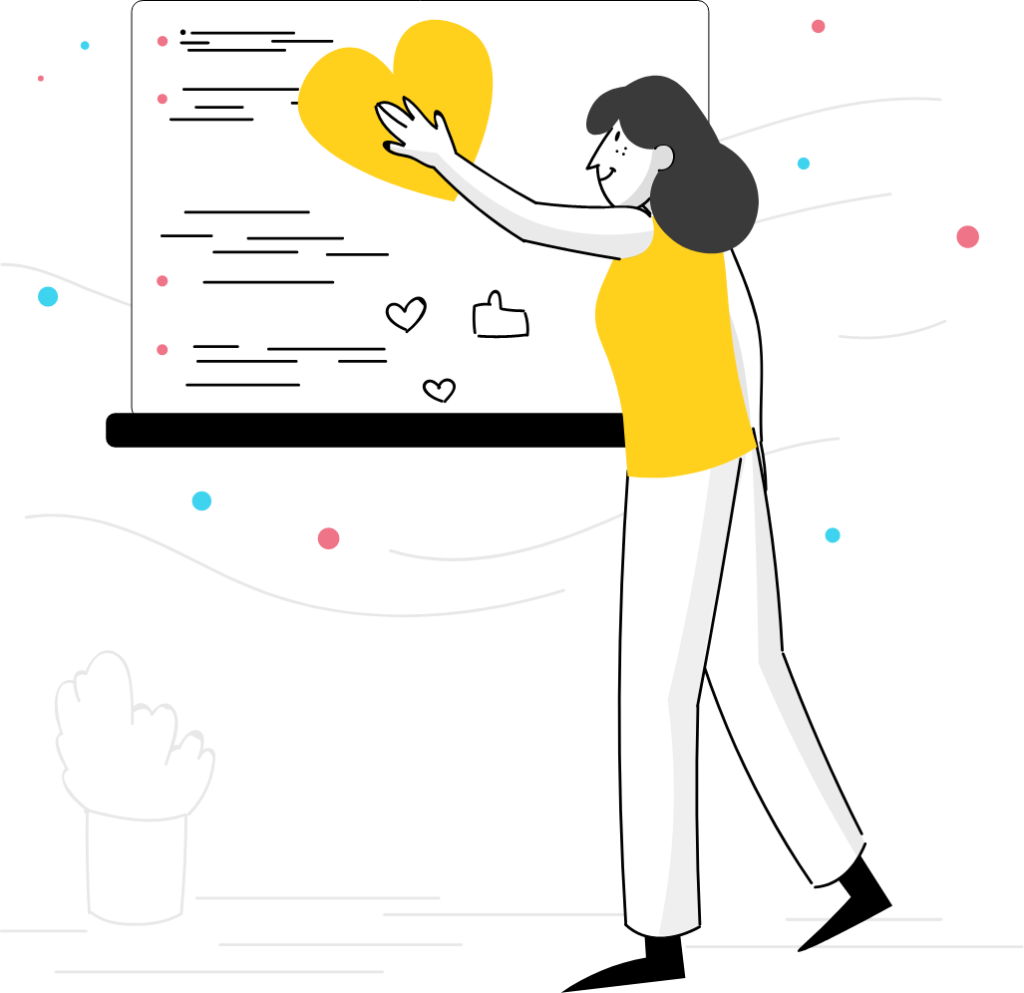How AI Chatbots Enhance User Experiences in Software Development
In the rapidly evolving tech landscape, where software development plays a pivotal role in driving innovation, ensuring a seamless user experience is paramount. To achieve this, developers are increasingly turning to artificial intelligence (AI) chatbots as invaluable tools. These intelligent virtual assistants are changing the way software is developed, maintained, and experienced.
In this quest for excellence, AI chatbots have emerged as powerful tools, reshaping the landscape of software development and many other industries. As a testament to their transformative potential, many software industries have already reshaped various industries by developing chatbots for business purposes. Notable examples are software development by Space-O Technologies, IBM, and Google which have leveraged AI chatbots to craft tailored solutions for various industries.
However, in this article, we will delve into the exciting realm of AI chatbots and explore how they are revolutionizing the way we create, maintain, and interact with software. Whether you’re a seasoned developer or a curious entrepreneur, the insights we’re about to uncover can redefine the way you perceive software development.
So, let’s get started.
The Rise of AI Chatbots in Software Development
AI chatbots are not static tools; they are continually learning and rising. According to Statista, the chatbot market is anticipated to witness significant growth, with a projected value of approximately 1.25 billion U.S. dollars in 2025, marking a substantial increase from its 2016 size of 190.8 million U.S. dollars. Hence, AI chatbots, powered by artificial intelligence, are reshaping the landscape of software development. These remarkable digital assistants are no longer just conveniences; they play a pivotal role in how software is created, maintained, and used.
Moreover, in the upcoming years, AI chatbots will change the software development landscape in profound ways. They will not only continue to improve user experiences but also impact various aspects of the development process faster development cycles, data-driven decision making, enhanced security, and reduced development costs.
Moreover, in the next section, we will learn how chatbots are enhancing user experience in software development and elevating software development processes and operations in the current fast-paced AI world.
20 Ways AI Chatbots Enhance User Experience in Software Development
Here are the 20 ways that AI chatbots enhance the user experience in software development.
1. Real-time Customer Support
AI chatbots provide immediate assistance to users, addressing their queries and concerns 24/7. This ensures that users receive timely support, leading to higher satisfaction levels.
2. Personalized Recommendations
By analyzing user behavior and preferences, AI chatbot can offer personalized product or content recommendations. This enhances user engagement and encourages them to explore more.
3. Efficient Issue Resolution
Chatbots can troubleshoot common issues and guide users through problem-solving steps. This leads to quicker issue resolution and reduces frustration among users.
4. Seamless Onboarding
AI chatbots can assist new users with onboarding processes, helping them set up accounts, configure settings, and understand how to use the software effectively.
5. Instant Information Retrieval
Users can quickly access information, such as product details, FAQs, or tutorials, by interacting with chatbots. This minimizes the time spent searching for information.
6. Streamlined Booking and Reservations
In industries like travel and hospitality, chatbots simplify the booking and reservation process, making it easy for users to plan their trips or make appointments.
7. Proactive Notifications
Chatbots can send proactive notifications to users, such as order updates, appointment reminders, or important announcements, keeping them informed and engaged.
8. Language Support
AI chatbots can communicate with users in multiple languages, making software accessible to a global audience and breaking down language barriers.
9. Guided Tours
Chatbots can offer guided tours of software interfaces, helping users explore features and functionalities at their own pace.
10. Data Security
AI chatbots can assist in user authentication and reinforce data security by verifying user identities and guiding them through security protocols.
11. In-App Feedback Collection
Chatbots can collect user feedback and suggestions within the app, providing a convenient way for users to share their opinions and helping developers make improvements.
12. Automated Documentation
Chatbots can generate and update documentation, such as user manuals and FAQs, ensuring that users always have access to the latest information.
13. Integration with Other Apps
Chatbots can integrate with other applications, streamlining workflows and allowing users to perform tasks without leaving the software.
14. Error Handling
When errors occur, chatbots can provide clear explanations and step-by-step instructions for resolving issues, reducing user frustration.
15. User Training
AI chatbots can offer training modules and tutorials to help users become proficient in using the software, promoting self-sufficiency.
16. Conduct Surveys
Chatbots can conduct user surveys to gather valuable insights, allowing developers to make data-driven improvements.
17. A/B Testing
Chatbots can assist in A/B testing by helping users navigate different versions of the software and providing feedback on their preferences.
18. User Engagement Strategies
AI chatbots can implement engagement strategies, such as gamification or loyalty programs, to keep users interested and motivated.
19. Cross-Platform Assistance
Chatbots can assist various platforms, including websites, mobile apps, and social media, ensuring a consistent user experience.
20. Predictive Analytics
By analyzing user data, chatbots can predict user needs and proactively offer solutions or recommendations, further enhancing the user experience.
Incorporating AI chatbots into software development not only improves user experience but also contributes to efficiency, user engagement, and overall customer satisfaction. These 20 ways showcase the versatility and impact of AI chatbots across various aspects of software usage.
Now, let us find out how chatbots have enhanced the learning experience in software development through different case studies.
Case-Study:
Case Study 1: Accelerating Developer Onboarding
Challenge: A software development company aimed to improve the efficiency of onboarding new developers.
Solution: They implemented a chatbot-driven onboarding system. The chatbot provided personalized training modules, addressed technical queries, and tracked progress. This resulted in a more efficient onboarding process and increased developer proficiency.
Case Study 2: Real-time Coding Support for Students
Challenge: A coding boot camp sought to provide real-time coding assistance to its students.
Solution: They introduced a chatbot that offered instant code feedback, explanations, and debugging support. This chatbot significantly improved student performance and reduced the workload on instructors.
Case Study 3: Remote Learning Enhancement
Challenge: A university needed to enhance remote learning support for software development students.
Solution: They integrated a chatbot into their learning management system, allowing students to quickly access course-related information and receive timely answers to questions. This improved student engagement and satisfaction with remote learning.
Case Study 4: Gamified Learning Experience
Challenge: An educational software provider aimed to make software development courses more engaging.
Solution: They introduced a gamified learning platform with chatbot mentors that guided students through coding challenges. This gamification approach led to increased course completion rates and improved coding skills among students.
Case Study 5: Facilitating Collaboration Among Developers
Challenge: A tech-focused community platform that wanted to encourage collaboration among software developers.
Solution: They deployed a chatbot that matched developers based on their interests and skills for collaborative coding projects. This approach significantly increased project collaborations, knowledge sharing, and skill development among community members.
Now, let us know the role of AI chatbots in software development ethics in the next section.
The Role of AI Chatbots in Software Development Ethics
In the ever-evolving landscape of AI-driven software development, ethical considerations play an increasingly crucial role. AI chatbots, as integral components of this ecosystem, are not exempt from these ethical challenges.
Developers and organizations must grapple with ethical questions surrounding AI chatbots, such as data privacy, bias mitigation, and transparency. Ensuring that chatbots respect user privacy and handle sensitive data responsibly is paramount. Additionally, addressing bias in chatbot responses to avoid perpetuating stereotypes is an ongoing concern.
Transparency is another key aspect of ethical AI chatbot development. Users should be aware when they are interacting with a chatbot, and clear guidelines must be established to distinguish between human and AI interactions.
Furthermore, as AI chatbots continue to learn and adapt, ethical guidelines must evolve with them. This includes regular audits and assessments to monitor their behavior and ensure alignment with ethical standards.
Ultimately, ethical AI chatbot development not only safeguards user trust but also contributes to a more responsible and sustainable software development environment. As developers, it’s our responsibility to navigate these ethical challenges and harness the transformative power of AI chatbots in ways that benefit users and society as a whole.
So, after knowing the role of chatbots in software development ethics let us know a few future trends in chatbots and software development that will enhance user experience significantly.
Emerging Future Trends in Chatbots and Software Development
Voice and Multimodal Interfaces:
The evolution of chatbots to incorporate voice recognition and support for multimodal interactions enables developers to create more accessible and diverse user experiences.
AI-Enhanced Code Generation:
The potential for chatbots to assist in code generation and automation, speeding up development processes and reducing the need for manual coding.
Advanced Natural Language Processing:
The integration of advanced natural language processing capabilities, allows chatbots to better understand and respond to developer queries and requests.
Enhanced Collaboration Tools:
The development of chatbots that serve as advanced collaboration tools, facilitating real-time teamwork among software developers and fostering creativity.
AI-Powered Code Reviews:
The use of chatbots to perform automated code reviews, identifying potential issues, security vulnerabilities, and best practices to improve software quality.
Chatbots in DevOps:
How chatbots are increasingly being used in DevOps practices to automate deployment, monitoring, and maintenance tasks, ensuring more robust and reliable software.
Customizable Chatbots:
The trend towards customizable chatbots that can be tailored to specific software development needs, supporting various programming languages and frameworks.
Integration with Project Management Tools:
The integration of chatbots with project management tools enables developers to seamlessly track progress, manage tasks, and receive updates.
AI-Driven Testing:

The use of chatbots for AI-driven testing, including regression testing and performance testing, to ensure software quality.
Ethical Considerations:
Discussion on the ethical considerations and challenges associated with AI chatbots in software development, including data privacy and bias mitigation.
Augmented Reality (AR) Integration with Chatbots
As augmented reality gains traction in various industries, integrating AR capabilities with chatbots is an emerging trend that promises to transform user experiences. Chatbots can provide users with real-time information, guidance, or product details through AR overlays. For instance, in the field of remote technical support, users can interact with a chatbot while wearing AR glasses, allowing them to receive visual step-by-step instructions or real-time troubleshooting assistance directly in their physical environment. This trend not only enhances user engagement but also opens up new possibilities for immersive and interactive software interactions.
Moreover, to compete in the current AI world and to adapt the future emerging trends faster you need skills to stay competitive. To know more about such competitive skills you can refer to the blog skills you need to stay competitive in the age of AI. The blog will provide you with all the important information about the necessary skills required to stay competitive in the current AI world and such skills will also help you adopt the emerging AI trends faster.
Conclusion:
In an era where technology evolves at a breakneck pace, AI chatbots have emerged as trailblazers, reshaping the landscape of software development. They are not just tools; they are transformative forces that enhance efficiency, foster innovation, and prioritize user-centric experiences.
From automating repetitive tasks to providing real-time support, AI chatbots streamline development processes, freeing developers to focus on creativity and problem-solving. Their capacity for continuous learning and adaptability ensures that they remain at the forefront of development trends and best practices.
Moreover, AI chatbots extend their influence beyond development, enhancing security, ensuring compliance, and elevating the overall quality of software products. They are the guardians of code integrity and the architects of user satisfaction.
As we embark on this journey into the future of software development, it’s clear that AI chatbots are not just tools but indispensable partners. Whether you’re a seasoned developer seeking efficiency or an entrepreneur aiming for user-centric excellence, the insights uncovered here illuminate the path forward. Embrace the power of AI chatbots, and together, we’ll chart a future where software development knows no bounds.





